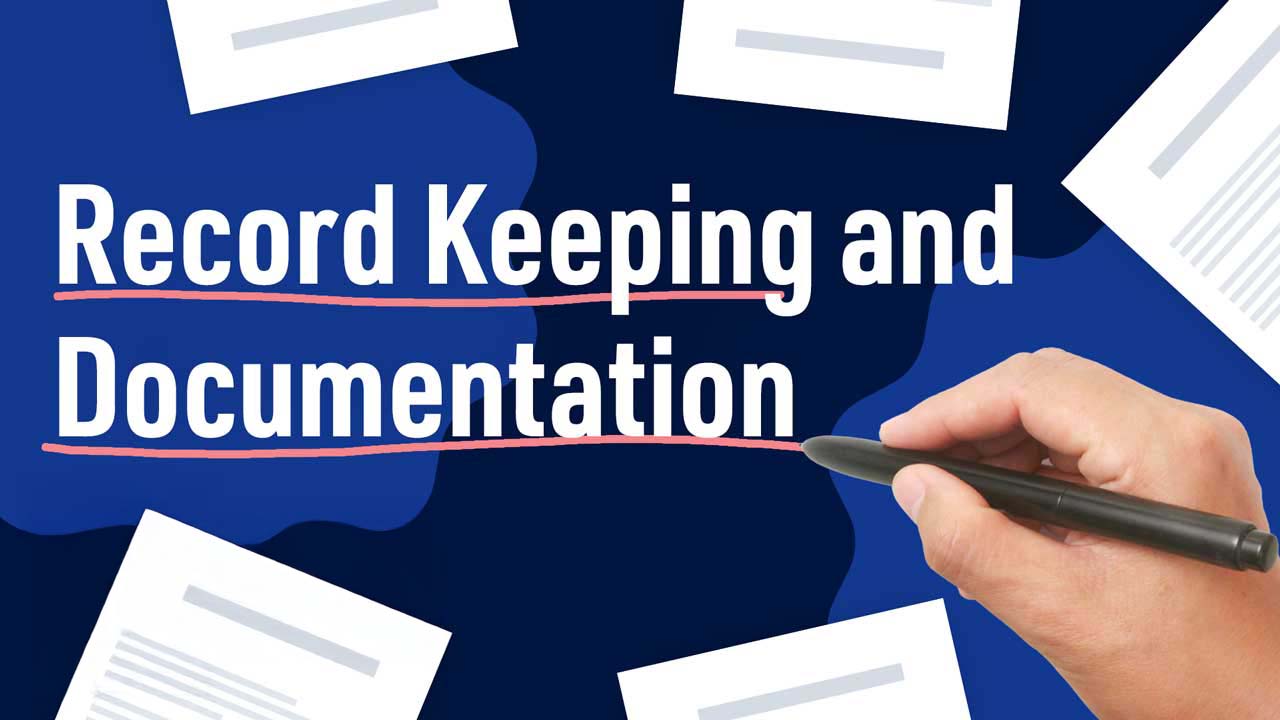Good record keeping is a fundamental part of delivering safe patient care (ACSQHC 2022).
An accurate written record detailing all aspects of patient monitoring is important, not only because it forms an integral part of the provision of care or nursing management of the patient but also because it contributes to the circulation of information amongst the different teams involved in the patient’s treatment or care.
In a legal sense, documentation and record keeping are also there to protect the nurse or healthcare professional.
A well-kept record can protect the practitioner in instances where the legal defence of their actions is required. Documentation also ensures a matter of professionalisation and proof of the improvement of practices.
Types of Record Keeping Used in Healthcare
- Hand-written records
- Computer-based systems (electronic)
- Some organisations or employers will use a combination of both.
(ACSQHC 2019)
You’ll be expected to be able to comply with whatever requirements your employer or organisation sets for record-keeping. That means you’ll need to:
- Ensure that you are up-to-date on the information systems and tools in your workplace, including their security, confidentiality and appropriate usage
- Protect any passwords or details given to you to enable your access to any systems
- Make sure written records are not left in public places where unauthorised people might see them (including any electronic systems or displays)
- Ensure that an entry is made in a patient’s medical record whenever a health professional sees the patient.
Patient Health Records Might Include:
- Identification information
- Medical history
- Allergies
- Assessments and reports from allied health professionals and consultant specialists
- Medication information
- Medical directives such as wills and do-not-resuscitate orders
- Laboratory and medical imaging results
- Consent forms
- Financial information
- Care plans/progress notes
- Handover notes
- Checklists such as vital sign observation charts and fluid balance charts
- Admission notes
- Discharge summaries.
(ACSQHC 2019; Folio3 2023)
Record Keeping and Documentation in Aged Care
The strengthened Aged Care Quality Standards outline several types of record keeping that should be undertaken in relation to older people, including:
- Whether an older person identifies as an Aboriginal and Torres Strait Islander person
- Changes in an older person’s quality of life
- Incidents and near misses
- Feedback and complaints
- Older people’s needs, goals and preferences
- The use of restrictive practices
- Dementia care
- Prescribed medications
- Choking and swallowing incidents
- Mealtime support strategies
- Assessment results and recommended interventions and support strategies
- Cognitive impairment diagnoses
- Nutrition, hydration and mealtime needs and preferences
- Functional capacity for activities of daily living
- Transitions of care
- Care and service plans.
(ACQSC 2024a-f)

Principles of Good Record Keeping
Record keeping is a tool for professional practice and one that should help the care process. It is not separate and not an optional extra to be fitted in if circumstances allow.
A record should be made as soon as possible after the patient is seen or the procedure is complete. It’s important that accurate record is made in the patient’s notes and should include interventions and any response to the interventions.
Key factors underpin good record keeping. You should:
- Record events in chronological order (in order of date and time)
- Always ensure you are using the correct patient’s health record before documenting
- Use a black pen (as it’s easier to digitise and copy)
- Write legibly
- Avoid leaving spare lines and gaps between entries
- Write entries as soon as possible after performing an intervention (for example, after performing a procedure)
- Use the 24-hour clock format (for example, write 9:00 am as 0900 and 2:30 pm as 1430)
- Don’t back-date entries
- Label all entries clearly, e.g. with your job title or discipline
- Sign your entries and clearly print your name and title
- (In some cases, such as if you’re a student nurse or care worker, the RN will need to co-sign your entry)
- If you make a mistake: Draw a neat line through the error, and sign and date the change
- Use standard abbreviations only and avoid non-standard terminology - remember that anyone reading the document should be able to understand the content
- Ask your supervisor what abbreviations you can use
- If you don’t recognise an abbreviation used, ask your supervisor to explain it to you
- Write objective information only - that is, what can be directly seen, heard, felt or smelled.
- Avoid subjective information such as personal bias, judgement, speculation or emotional statements
- However, if you feel it’s important to include a subjective statement made by the patient or another person, you can record this - for example, ‘husband reports improved speech’.
- Ensure all your documentation meets all medico-legal requirements. These requirements for medical records are set out in Commonwealth, state and territory legislation, for example, the Commonwealth Health Insurance Act 1973, which sets out requirements for Medicare records. Refer to your state or territory’s legislation for more specific information on what medico-legal requirements apply to you.
- Do not use symbols like arrows to indicate a rise or fall in observations.
(ACSQHC 2019; Queensland Health 2019; Hughes 2021; Avant Mutual 2012; Ausmed 2023)
Benefits of Good Record Keeping
- Facilitates continuity of care
- Promotes better communication and dissemination of information between members of the interprofessional team
- Helps to address complaints or legal processes
- Supports clinical audit, research, allocation of resources and performance planning
- Helps to identify risks and enables the early detection of complications
- Supports patient care and patient-centred communication
- Supports effective clinical judgement
- Supports delivery of services
- Helps improve accountability
- Shows how decisions were made relating to the patient’s care
- Enables an organisation’s care and services to be evaluated, for example, through auditing and star ratings
- Ensures organisations meet statutory requirements such as the Aged Care Quality Standards
- Provides evidence of care should it be called upon in an audit or legal proceeding or a healthcare worker's performance review
- Provides a historical account of the patient’s health journey.
(Jevon 2012; Queensland Health 2019; Ausmed 2023)
Common Deficiencies in Record Keeping
Poor record keeping hampers patient care and makes it difficult for healthcare professionals to defend their practice.
The most common deficiencies in record keeping include:
- An absence of clarity
- Inaccuracies
- Spelling mistakes
- Missing information
- Failure to record action taken when a problem has been identified.
(Dimond 2005)
Legal Issues in Record Keeping
A patient’s records are occasionally required as evidence before a court of law or to investigate a complaint at an organisational level.
Sometimes records may be requested by professional governing bodies when investigating claims related to misconduct (Queensland Health 2019).
Therefore, you must take care about what you write. Not only will you be asked to formally explain your records in case of, for instance, a complaint from a patient/client, but you also have both a professional and legal duty of care.
It is critical to keep up-to-date with the legal requirements and best practices of record-keeping, proving that:
- A comprehensive nursing assessment of the patient has been undertaken, including care that has been provided and planned
- Relevant information is included together with any actions that have been taken in response to changes in patients’ conditions
- The duty of care to the patient has been provided and no acts or omissions have compromised a patient’s safety
- Arrangements have been made for the ongoing care of the patient.
(Jevon 2012)
Delegation and Countersigning
A registered nurse is accountable for any delegation of record keeping to members of the interprofessional team who are not registered practitioners, such as assistant practitioners (AP), care assistants and nursing students (Jevon 2012).
As with any delegated activity, registered nurses should:
- Provide supervision until the team member is competent at undertaking the activity alone
- Only countersign if they have witnessed the activity or can validate that it took place
- Always follow local policies around record keeping, delegation and countersigning.
Conclusion
When caring for a patient, it is important to ensure good record keeping to promote patient care and better communication. Good record keeping is a product of good teamwork and an important tool in developing high-quality healthcare and reinforcing professionalism within nursing.
Test Your Knowledge
Question 1 of 3
True or false: Original entries in patient records should be legible, even if changes have occurred.
Topics
Further your knowledge
References
- Aged Care Quality and Safety Commission 2024a, Standard 1: The Individual, Australian Government, viewed 18 April 2024, https://www.health.gov.au/resources/publications/strengthened-aged-care-quality-standards-august-2025?language=en
- Aged Care Quality and Safety Commission 2024b, Standard 2: The Organisation, Australian Government, viewed 18 April 2024, https://www.health.gov.au/resources/publications/strengthened-aged-care-quality-standards-august-2025?language=en
- Aged Care Quality and Safety Commission 2024c, Standard 3: Care and Services, Australian Government, viewed 18 April 2024, https://www.health.gov.au/resources/publications/strengthened-aged-care-quality-standards-august-2025?language=en
- Aged Care Quality and Safety Commission 2024d, Standard 5: Clinical Care, Australian Government, viewed 18 April 2024, https://www.health.gov.au/resources/publications/strengthened-aged-care-quality-standards-august-2025?language=en
- Aged Care Quality and Safety Commission 2024e, Standard 6: Food and Nutrition, Australian Government, viewed 18 April 2024, https://www.health.gov.au/resources/publications/strengthened-aged-care-quality-standards-august-2025?language=en/food-and-nutrition
- Aged Care Quality and Safety Commission 2024f, Standard 7: The Residential Community, Australian Government, viewed 18 April 2024, https://www.health.gov.au/resources/publications/strengthened-aged-care-quality-standards-august-2025?language=en/residential-community
- Ausmed 2023, ‘Documentation in Aged Care’, Ausmed, 17 May, viewed 18 April 2024, https://www.ausmed.com.au/learn/training-modules/documentation-in-aged-care
- Australian Commission on Safety and Quality in Health Care 2022, Action 6.11: Documentation of Information, Australian Government, viewed 18 April 2024, https://www.safetyandquality.gov.au/standards/nsqhs-standards/communicating-safety-standard/documentation-information/action-611
- Avant Mutual 2012, Medical Records and You, Avant Mutual, viewed 18 April 2024, https://member.avant.org.au/uploadedFiles/content/resources/member/risk-201008-medical-records-and-you.pdf
- Australian Commission on Safety and Quality in Health Care 2022, Documentation of Information, Australian Government, viewed 18 April 2024, https://www.safetyandquality.gov.au/standards/nsqhs-standards/communicating-safety-standard/documentation-information
- Dimond, B 2005, ‘Exploring Common Deficiencies That Occur in Record Keeping’, British Journal of Nursing, vol. 14, viewed 18 April 2024, https://www.magonlinelibrary.com/doi/abs/10.12968/bjon.2005.14.10.18106
- Folio3 2023, Executive Summary – 10 Components of a Medical Record, Folio3, viewed 18 April 2024, https://digitalhealth.folio3.com/blog/10-components-of-a-medical-record/
- Hughes, Z 2021, ‘Correct Identification and Procedure Matching’, Ausmed, 20 August, viewed 18 April 2024, https://www.ausmed.com.au/learn/articles/correct-identification-procedure-matching
- Jevon, P & Ewens, B 2012, Monitoring the Critically Ill Patient, 3rd edn, Wiley-Blackwell, Oxford.
- Queensland Health 2019, Guidelines for Allied Health Assistants Documenting in Health Records, Queensland Government, viewed 18 April 2024, https://www.health.qld.gov.au/__data/assets/pdf_file/0029/144866/ahadocguide.pdf
 New
New 

